Which Of The Following Is Not A Way That Technology Is Used In Crm?
What is CRM?
A definition of CRM
and why it'southward and then of import for your business concern.
- 1. What is CRM?
- 2. What is the meaning of CRM?
- 3. What can a CRM system do?
- 4. Why is CRM important?
- 5. What are the benefits of CRM?
- 6. Which business functions need a CRM system?
- 7. On-premise CRM vs Cloud CRM
- 8. Who invented CRM?
- More questions?
Visit our Learning Centre
What is CRM?
CRM is an abbreviation forCustomer Relationship Management. It's a arrangement used to build and manage customer relationships.
A CRM system helps businesses manage all the interactions it has with customers and potential customers. With a CRM platform, customer preferences are recorded, and customer activity can be tracked. So every time they are spoken to, regardless of who they talk to, customers go a fully personalised and consistent experience.
CRM software helps organisations streamline their processes and workflows so that every office of the business is on the same folio. Sales and marketing teams, especially, rely on CRM to create collaboration and amend their productivity.
The overall aim is to provide more engaging customer experiences, increase customer loyalty and retention, and drive concern growth and profitability.
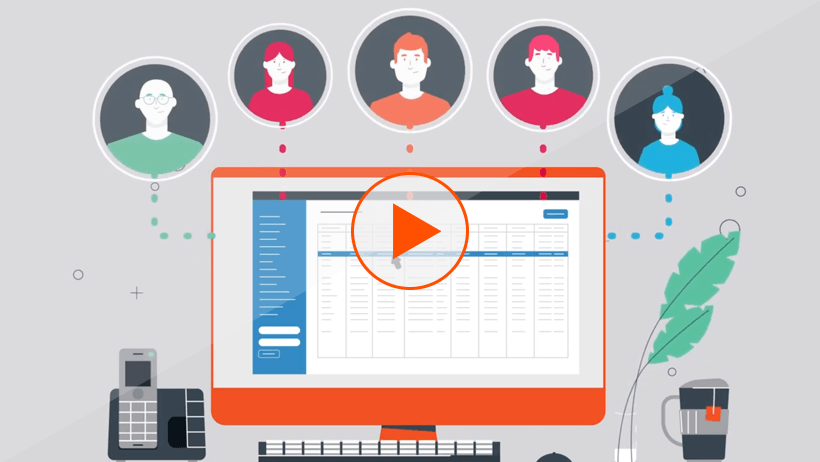
Check out this brief video to learn more
Start Creating More Meaningful Relationships With Human activity!
Kickoff your 14 day free trial today. No download or credit carte required.
What is the meaning of CRM?
When yous hear people talk about CRM, they might refer to the overall strategy of customer relationship direction. Its goal is to increase sales and profitability, create long-lasting relationships with customers, and increase customer retentivity. It focuses on putting the customer starting time and delivering a better, more personalised client feel.
On the other hand, people frequently use 'CRM' for the technology, which helps a business keep the information of all its customers, leads and prospects stored and organised in 1 place. In addition to this, a CRM solution allows a business to track all customer interactions.
What can a CRM system do?
A CRM system maintains and manages data obtained from multiple sources and touchpoints, including electronic mail, the company website, alive chat, telephone, and social media, etc.
Information technology'due south a database that stores customer-specific data like buying history, specific wants and needs, purchasing preferences and fiscal demographics, creating a holistic view of the client, and promoting more than engaging and consistent interactions.
Another features include:
-
Reporting and dashboards: A CRM provides its users with the ability to visualise important trends and business metrics.
-
Sales direction: With a CRM software, a business organisation tin can rail its sales process from the initial atomic number 82, or prospect stage, to becoming opportunities, through to the final order conversion stage.
-
Marketing entrada management: A CRM organization allows you to manage campaigns from start to end using automated workflows wherever necessary.
-
Service management: A CRM system allows you to manage service delivery from before purchase, to contract delivery and renewal, and whether your service is preventative or reactive, and delivered on site or remotely.
-
Insights generation: A CRM tool can also analyse large amounts of data and generate actionable insights from it.
In add-on to allowing a business organisation to manage its customer relationships better, a CRM as well helps in:
-
Increasing revenues past increasing sales opportunities: A sales CRM system provides an organization with data and insights it can use to identify more sales opportunities.
-
Segment customers with ease: A CRM allows you to profile your customers based on purchase indicators like history, demographics, engagement and level of interest etc.
-
Cross-departmental alignment: A CRM system helps in aligning your marketing and sales teams which creates harmony within the workforce and increases productivity.
How do I choose a CRM arrangement?
Selecting a CRM solution that fits your needs (and your wallet) can be tough. Before you invest in a particular system, it's important to be clear nigh your priorities, IT competence, and upkeep right from the start. Our free CRM guide volition help you notice the correct CRM product for your business.
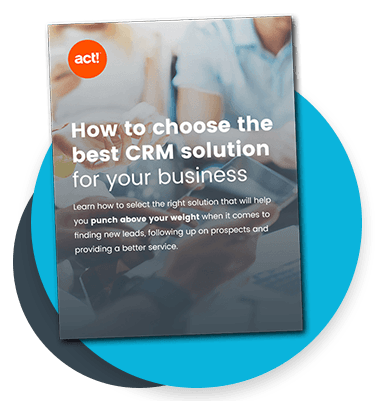
Why is CRM important?
The customer base of a business is one of its biggest assets, if not THE biggest. However, especially when you are trying to grow your business organization, it becomes more challenging to go on track of your customers and potential customers.
You might ask yourself, who are our customers, what do they need, and when was the terminal time we interacted with them? Is our sales pipeline healthy? Are customers engaging with our content?
Your customers and prospects will almost likely start to wander off. They aren't happy with merely a loftier-quality service or product. They need to feel engaged, and they want a business organization to give them the respect and personalised experience that makes them feel similar they belong.
With a CRM system, a business organisation ensures that it establishes long-term customer relations by knowing every item (their needs, wants, and behaviours) about them, at all times. A satisfied customer is more likely to return to your company for more than purchases and to recommend your products or services to their friends and family unit.
Non sure if your business needs a CRM system? Bank check out these 10 signs you might need a CRM.
A survey conducted on Act! customers revealed that 75% of users believe that their CRM software helped them grow their business1.
What are the benefits of CRM?
Interact through integration
Integrating data from different functions of a business helps you maximise effectiveness through collaboration. For example, potential customer contact details can be 'pushed' from pb capture forms on your website, into 'hot lead' action lists in your CRM solution – maximising collaboration between marketing and sales.
Manage pipeline finer
Past being able to visualise your sales pipelines, yous can meet exactly which deal needs your immediate attention and which deal has gone stale. Past periodic monitoring of deals that laissez passer through your pipeline, you can place areas of concern and eliminate them, ensuring a clog-gratuitous pipeline at all times. Additionally, your marketing and sales team are better connected, ensuring your sales pipeline is always filled with high-quality leads.
Automate for maximum productivity
Businesses often execute various processes every day that consist of a series of redundant tasks carried out by multiple users. A CRM organization can help you lot automate those processes to salve time and drive consistency. You can automate tasks such as scheduling follow-up activities, sending email campaigns, or assigning contacts to a new sales rep. This way, you lot tin make certain all your team members are following the same process from start to finish, and you eliminate the demand for repetitive manual work.
Engage to build lasting client relationships
In the modernistic technological globe, a client expects a lot more than from a company than just a reasonably-priced, high-quality production or service. They want to feel understood, and they want to have an engaging, personalised feel whenever they make it touch with the company or vice versa. A CRM captures and stores every customer's journey from the beginning to the very end. Past knowing their preferences, you can sympathise their needs, and by somewhen giving them what they need, you get their loyalty in return.
Improve client experience with shared information
For case, if a client experiences a problem with your product, multiple teams tin can work together to solve the issue. While your technical back up squad is fixing the consequence, the client service team can communicate the solution to the customer and provide farther assistance. At the same time, the marketing team can adapt their messaging.
Increase revenues
A CRM helps you improve levels of client satisfaction, and retentivity – happy and long-term customers entail increased revenues. Information technology also lets y'all save a lot of time by automating essential business tasks and promoting collaboration between different business functions. These time savings and productivity gains enable you lot to lower costs. Lastly, with a CRM system, you tin create targeted marketing campaigns so that you tin attain out to the correct people at the right time and increase sales.
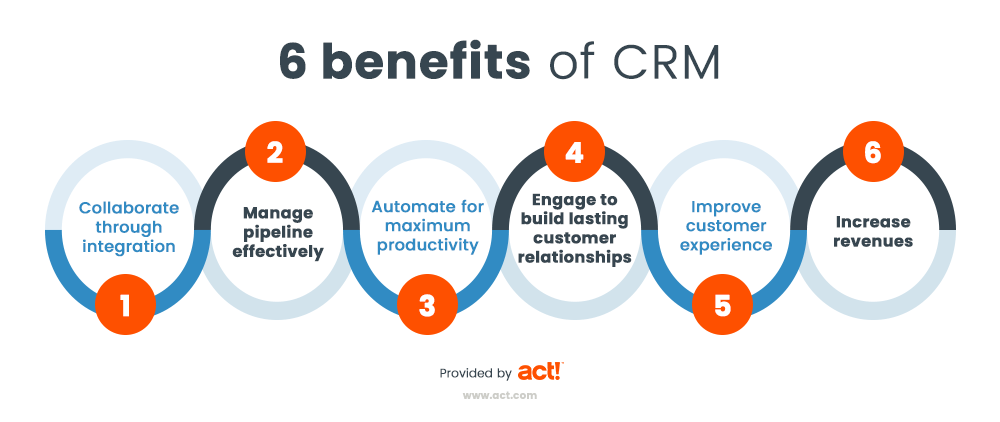
Which business functions demand a CRM system?
Marketing Team
Marketing is not but about creating the perfect campaign; it'south also a lot nigh reaching out to the right people. With a CRM system, you can dissever your customer base of operations into segments, allowing you to transport customised messages to every segment.
Benefit from improved lead management: Lead capture forms on your website can be integrated into your client relationship management software and passed on to your sales team to follow upwardly.
Since all the customers' activity is tracked in the system, marketing can proceeds valuable insights into their behaviour.
Sales Squad
With CRM technology, your sales team tin can streamline the whole sales procedure and shorten the sales wheel. By being able to visualise the sales pipeline, your sales reps can place the deals that require immediate attending and focus on the about valuable opportunities.
They can schedule calls, follow-ups, and meetings, take notes and send invoices. Additionally, your sales manager can run sales reports and forecasts to rails all sales activities and review their team'due south performance.
Customer Service Squad
Using a CRM organisation helps y'all store customer preferences and track all activities associated with them. If a customer tells you that they don't want to receive weekly email updates, you can simply tick a box against them in the CRM, and the emails will finish.
Your client service squad can manage and monitor any post-sale interactions in the CRM system and share important updates with the sales or marketing team. This way, they can fix potential issues and provide solutions faster.
Then how does a CRM organisation piece of work?
Effort Human activity! free for 14 days. Sign upwardly for a complimentary trial and experience the power of CRM and Marketing Automation in ane.
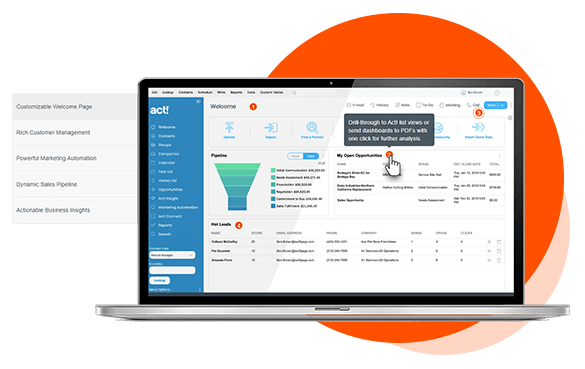
On-premise CRM vs Cloud CRM: which is best for yous?
A Deject CRM is simply a Customer Human relationship Management system that uses Cloud calculating engineering science to host your CRM application. In other words, your customer information is stored on the CRM vendor's servers in a data middle. A traditional CRM system hosts your customer data on a server in your office.
One of the major benefits of Deject CRM app is that in that location is no hardware to install or software maintenance problems to worry nigh, compared to taking things in-house. And without the often pregnant upfront upper-case letter expenditure on IT infrastructure or data heart costs, the Cloud'south 'pay equally you lot go' approach is very appealing to many businesses.
Cloud computing is often more secure than many private data centres. A skillful Deject service provider volition accept robust processes in place to ensure your information is protected, accessible at all times, and regularly backed-up.
Moving to a Cloud solution?
Learn more about Cloud calculating solutions and download our free guide 'Moving to a Cloud solution: 35 questions for you and your vendor'.
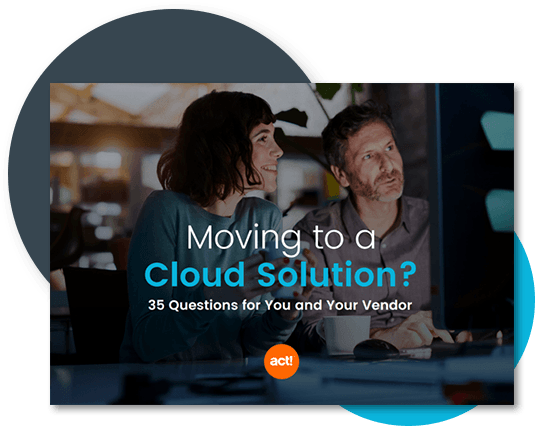
Who invented CRM?
Pat Sullivan and Mike Muhney released the first-ever CRM in 1987 by the name of ACT!. It was basically a digital Rolodex that enabled its users to organise and store client information effectively.
In the 80s, a lot of features that contemporary CRM systems have didn't exist yet. Act! made the evolution community realise the possible benefits of a organisation that harnesses the ability of client data to assistance a business manage its relationships better.
At the time, the term "CRM" did not exist. It was only in the 90s that people started to use information technology, after features similar sales automation, enterprise resource planning, and marketing capabilities complemented the contact management features of the software.
Wrapping upwards
Here's a quick summary of what you should know nigh CRM:
- Definition of CRM: CRM is an abridgement for Client Human relationship Management. It'southward a system used to build and manage customer relationships.
- CRM system: A CRM system is a technology, which helps a business continue the data of all its customers, leads and prospects stored and organised in 1 place.
- Importance of CRM: With a CRM organisation, a business organisation ensures that it establishes long-term relationships with its customers and streamlines processes to improve customer service, and drive business organization growth and profitability.
- Benefits of CRM: Edifice lasting customer relationships, streamlining and automating processes, creating better collaboration and advice, better pipeline management, and increased revenues
- Who needs a CRM?Sales, marketing, and customer service teams, as well as small business owners.
- On-premise v.south Cloud CRM: A Cloud CRM is a CRM organization that uses Cloud computing engineering to host your CRM application. A traditional CRM system hosts your customer information on a server.
- History of CRM: Pat Sullivan and Mike Muhney released the showtime-e'er CRM in 1987 by the name of Human action!.
Big results. Minor investment.
Prepare to take the showtime step?
Which Of The Following Is Not A Way That Technology Is Used In Crm?,
Source: https://www.act.com/en-gb/what-is-crm/
Posted by: zaratenowbod.blogspot.com


0 Response to "Which Of The Following Is Not A Way That Technology Is Used In Crm?"
Post a Comment